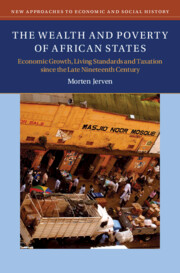 The Wealth and Poverty of African States
The Wealth and Poverty of African States Book contents
- The Wealth and Poverty of African States
- New Approaches to Economic and Social History
- The Wealth and Poverty of African States
- Copyright page
- Contents
- Figures
- Tables
- Preface
- Acknowledgments
- Introduction
- 1 A New Economic History for Africa?
- 2 Seeing Like an African State in the Twentieth Century
- 3 New Data and New Perspectives on Economic Growth in Africa
- 4 State Capacity across the Twentieth Century: Evidence from Taxation
- 5 Wages and Poverty: From Roots of Poverty to Trajectories of Living Standards
- 6 Conclusion
- Appendix to Chapter 3
- Notes
- Bibliography
- Index
1 - A New Economic History for Africa?
Published online by Cambridge University Press: 06 January 2022
- The Wealth and Poverty of African States
- New Approaches to Economic and Social History
- The Wealth and Poverty of African States
- Copyright page
- Contents
- Figures
- Tables
- Preface
- Acknowledgments
- Introduction
- 1 A New Economic History for Africa?
- 2 Seeing Like an African State in the Twentieth Century
- 3 New Data and New Perspectives on Economic Growth in Africa
- 4 State Capacity across the Twentieth Century: Evidence from Taxation
- 5 Wages and Poverty: From Roots of Poverty to Trajectories of Living Standards
- 6 Conclusion
- Appendix to Chapter 3
- Notes
- Bibliography
- Index
Summary
What is “new” and what is “old” in the economic history of Africa? The chapter presents the “new African economic history” and summarizes and considers the emerging themes and contributions of the last two decades. Examining the differences in the approaches taken by economists and historians when interpreting social and economic change in the African past, the chapter identifies the central research questions, and seeks to bridge gaps in the use of methods. The chapter sets out an agenda for African economic history that goes beyond the divide of “causal history” and “compression of history” (Austin 2008, Fenske 2010). A decade of research, particularly using colonial records, has extended the quantitative boundary of investigation and allowed for a richer economic history of the twentieth century in Africa, which has hitherto focused on the persistent negative effect of institutions on economic performance and the persistence of economic failure. The recognition and substantiation of historical economic and institutional change are important, since a dismissal of both economic growth and state formation as failed projects in the twentieth century risks not learning from history: The key is to understand under what circumstances states developed, and under which they did not.
Keywords
- Type
- Chapter
- Information
- The Wealth and Poverty of African StatesEconomic Growth, Living Standards and Taxation since the Late Nineteenth Century, pp. 6 - 38Publisher: Cambridge University PressPrint publication year: 2022
